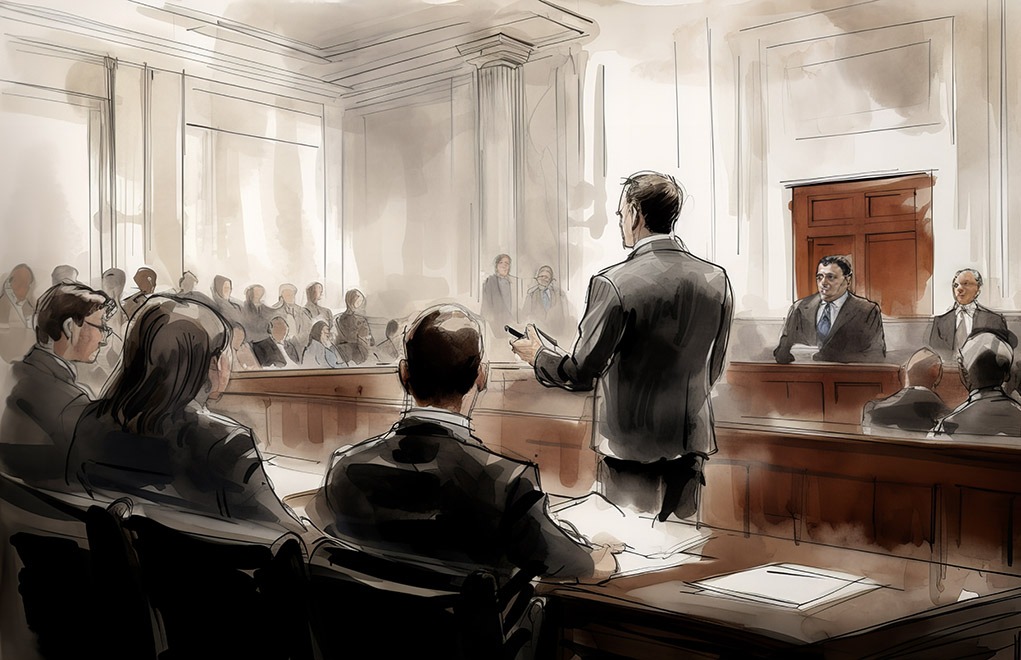If you’re forced to defend yourself and end up in court, will you be better off with a bench trial or a jury trial?
When facing criminal charges related to the use of force in self-defense, one of the decisions you’ll need to make is whether to proceed with a jury trial or waive that right in favor of a bench trial. Each option presents unique advantages and risks, and the decision ultimately hinges on the specific facts of your case, the judge presiding and the composition of the potential jury pool. Here, we’ll explore the circumstances that might lead you to choose a bench trial over a jury trial and the rationale behind each preference.
The Right to a Jury Trial
In felony cases, your right to a jury trial is guaranteed and absolute. However, this does not automatically mean you have a right to a bench trial. Waiving a jury trial in favor of a bench trial generally requires the consent of both the prosecutor and the court. Furthermore, in Indiana, as in many states, the law mandates that such a waiver must be fully informed and voluntary. If you are facing misdemeanor charges, you may also have the right to a jury trial, but only if you request it in a timely manner.
A jury trial consists of a group of citizens who act as the “fact finders” in the case. They evaluate the evidence, consider witness testimony, and determine whether the State has proven guilt beyond a reasonable doubt. In contrast, a bench trial places this responsibility solely in the hands of the presiding judge. This fundamental difference informs the decision-making process.
Factors Favoring a Bench Trial
While jury trials are often the default choice, certain circumstances might make a bench trial more appealing. One of the primary considerations is the identity and track record of the judge. If the judge has demonstrated a history of fairness and impartiality in self-defense cases, this could inspire confidence in their ability to fairly adjudicate the matter. Conversely, judges who have shown skepticism toward self-defense claims may discourage opting for a bench trial.
Another critical factor is the nature of the jury pool. Depending on the demographics and potential biases of the jurors, you may perceive the jury as less sympathetic to self-defense arguments. In such cases, a bench trial might be advantageous, as it eliminates the unpredictability of a jury’s decision-making process.
Bench trials also avoid voir dire, the process of questioning prospective jurors to identify biases and select a jury. While voir dire can help shape a favorable jury, it also introduces variability—jurors who express hostility toward self-defense claims could end up on the panel. In contrast, a bench trial ensures that only the judge’s views come into play, offering a more controlled environment.
Risks of a Bench Trial
Despite these potential advantages, bench trials carry significant risks. One notable downside is the lack of jury nullification. Jury nullification allows jurors to acquit a defendant despite the evidence and legal standards if they believe a conviction would violate their conscience. Jury nullification, while not viewed favorably by many judges and prosecutors, is rooted in the historical practice of allowing juries to act as a safeguard against unjust laws or their harsh application, thereby reflecting community values and morals in legal outcomes. Waiving a jury trial eliminates this possibility, which can be a powerful tool in cases where the strict application of the law may seem unjust.
Moreover, judges, like jurors, are not immune to bias. While judges are expected to filter out external influences such as media coverage, not all are equally adept at doing so. This concern is heightened in high-profile cases where extensive publicity might impact the judge’s objectivity.
Physical presentation is another consideration. In bench trials, defendants may not always have the option to appear without physical restraints, such as handcuffs or shackles, during the trial. While this may seem like a minor issue, it could subtly influence the judge’s perception of the defendant.
Prosecutorial Dynamics
Another distinction in bench trials is the possibility that the prosecutor may forgo an opening statement. While this could potentially benefit the defense, it might also allow the prosecution to avoid revealing its strategy upfront, making it harder to anticipate and counter their arguments. The absence of a jury changes the dynamic of the trial significantly, as judges are less likely to be swayed by rhetorical appeals or emotional arguments designed to influence a lay audience.
Key Considerations for Self-Defense Cases
Self-defense cases hinge on specific factual disputes, such as whether the defendant reasonably perceived an imminent threat and whether the use of force was proportionate. In a jury trial, these determinations are made by individuals who bring diverse life experiences to the deliberation room. While this diversity can be advantageous, it also introduces unpredictability. Jurors may misinterpret legal instructions, allow personal biases to cloud their judgment, or fail to grasp the nuances of self-defense laws.
In contrast, a judge’s legal training and experience may offer a more precise application of the law. Judges are also expected to base their decisions on evidence and legal standards rather than personal or emotional considerations. However, this reliance on a single individual’s judgment can be a double-edged sword. If the judge harbors biases or misinterprets the evidence, there is no collective deliberation to counterbalance their views.
The Decision-Making Process
Ultimately, the choice between a jury trial and a bench trial requires careful consideration of multiple factors: the specifics of the case, the characteristics of the potential jury pool and the identity of the presiding judge. Your legal team’s input is invaluable in assessing these variables and determining the best course of action.
For defendants in self-defense cases, the decision often boils down to a preference for the collective judgment of a jury versus the singular judgment of a judge. Each option carries inherent risks and benefits, and the choice must be tailored to the unique circumstances of the case.
By weighing these considerations thoughtfully, defendants can make an informed decision that maximizes their chances of achieving a favorable outcome. Whether you entrust your fate to a jury of your peers or place your confidence in a judge’s expertise, the goal remains the same: to secure an acquittal based on the just assertion of self-defense.
Editor’s Note: This article originally appeared in the March 2025 issue of Gun Digest the Magazine.
More Knowledge For The Armed Citizen:

Next Step: Get your FREE Printable Target Pack
Enhance your shooting precision with our 62 MOA Targets, perfect for rifles and handguns. Crafted in collaboration with Storm Tactical for accuracy and versatility.
Subscribe to the Gun Digest email newsletter and get your downloadable target pack sent straight to your inbox. Stay updated with the latest firearms info in the industry.
Read the full article here


















Leave a Reply